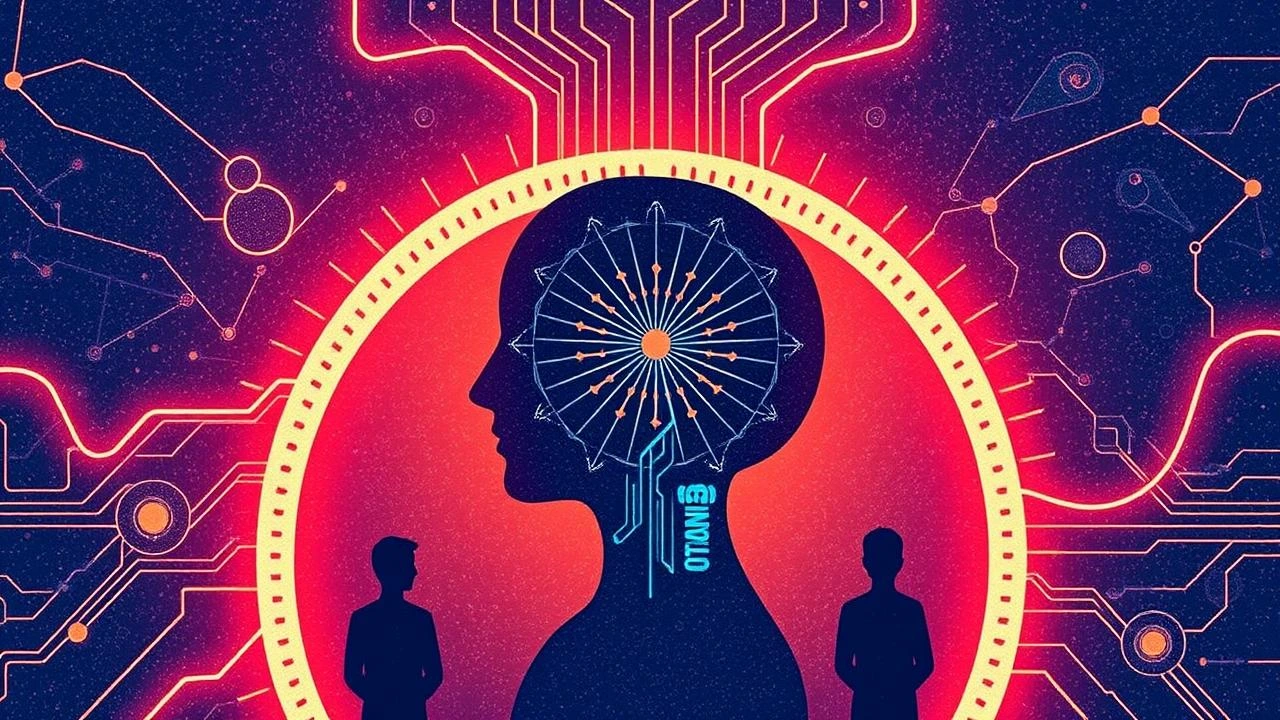The rapid advancement of Artificial Intelligence (AI) has ignited a global conversation about its potential to reshape our world, from revolutionizing industries to fundamentally altering the nature of work. Amidst this burgeoning technological landscape, India, a nation deeply rooted in human capital and innovation, articulates a distinct perspective. Union Minister Piyush Goyal has repeatedly emphasized a core belief: the human mind will always remain supreme and superior to any AI. This conviction underpins India’s approach to AI development, viewing it not as a harbinger of widespread job loss, but as a powerful tool that, when wielded by human ingenuity, can unlock unprecedented progress.
The allure of AI is undeniable. From sophisticated algorithms that can diagnose diseases with remarkable accuracy to self-driving vehicles promising increased efficiency, the capabilities of AI systems are expanding at an exponential rate. This has inevitably led to anxieties about automation and its impact on employment. Many nations are grappling with the potential for AI to displace human workers in various sectors, prompting discussions about reskilling, universal basic income, and the very definition of a fulfilling career.
However, India’s perspective, championed by figures like Piyush Goyal, offers a refreshing counterpoint to the prevailing doomsday scenarios. The argument is not to shy away from AI, but to embrace it with a clear understanding of its limitations and the inherent strengths of human intelligence. This viewpoint is rooted in the belief that while AI can process vast amounts of data, identify patterns, and execute tasks with speed and precision, it lacks the qualities that define human consciousness: creativity, critical thinking, empathy, intuition, and the capacity for complex ethical reasoning.
The Irreplaceable Qualities of the Human Mind
The human mind possesses a unique blend of cognitive and emotional faculties that are, at present, far beyond the reach of even the most advanced AI. Let’s explore some of these key differentiating factors:
- Creativity and Innovation: Humans are the source of novel ideas, artistic expression, and entirely new paradigms. While AI can generate creative content based on existing data, it cannot originate truly groundbreaking concepts or experience the spark of inspiration that drives human innovation.
- Critical Thinking and Problem-Solving: Humans possess the ability to analyze situations from multiple perspectives, question assumptions, and devise solutions to problems that are ill-defined or require nuanced understanding. AI, while adept at rule-based problem-solving, struggles with ambiguity and context-dependent reasoning.
- Emotional Intelligence and Empathy: The ability to understand and respond to human emotions, to build relationships, and to offer comfort and support are uniquely human traits. These are crucial in fields like healthcare, education, and customer service, where human connection is paramount.
- Ethical Reasoning and Moral Judgment: Humans grapple with complex ethical dilemmas, making decisions based on values, principles, and a nuanced understanding of societal impact. AI operates on programmed logic and data, lacking the capacity for genuine moral agency.
- Intuition and Adaptability: Human intuition, often described as a “gut feeling,” allows for rapid decision-making in uncertain situations. Coupled with our innate adaptability, humans can readily adjust to new environments and unexpected challenges, a flexibility that current AI systems find difficult to replicate.
- Consciousness and Self-Awareness: The very essence of being human lies in consciousness, self-awareness, and the subjective experience of the world. AI, as it currently exists, does not possess these attributes and operates on algorithmic processes.
This understanding shapes India’s approach. Instead of fearing job displacement, the focus is on leveraging AI to augment human capabilities, create new opportunities, and drive economic growth. The government’s vision is not one of humans competing with machines, but of humans collaborating with machines to achieve greater outcomes.
India’s Vision: AI as an Enabler, Not a Replacement
Piyush Goyal’s statements reflect a strategic outlook that sees AI as a powerful tool to enhance productivity, boost innovation, and address societal challenges. This perspective can be broken down into several key components:
- Augmentation, Not Automation: The primary goal is not to replace human workers but to empower them with AI-driven tools. This can free up individuals from mundane, repetitive tasks, allowing them to focus on higher-value activities that require critical thinking, creativity, and interpersonal skills.
- Skill Development and Re-skilling: India recognizes that the nature of work will evolve. Therefore, there is a significant emphasis on equipping the workforce with the skills necessary to thrive in an AI-enabled economy. This includes promoting STEM education, digital literacy, and specialized training in AI-related fields.
- Job Creation in New Sectors: While some existing jobs may transform, AI is also expected to create entirely new roles and industries. India aims to be at the forefront of developing and deploying AI solutions, thereby fostering job creation in areas such as AI development, data science, AI ethics, and AI-powered service delivery.
- Addressing Societal Challenges: AI holds immense potential to solve some of India’s most pressing issues, from improving healthcare access and agricultural productivity to enhancing disaster management and urban planning. By deploying AI in these critical sectors, India can improve the quality of life for its citizens.
- Fostering Innovation Ecosystems: The government is actively promoting an environment that encourages AI research, development, and entrepreneurship. This includes supporting startups, providing funding for R&D, and creating regulatory frameworks that foster responsible AI innovation.
The Indian government’s stance is a testament to its confidence in the inherent strengths of its human talent pool. It understands that the country’s demographic dividend, with its large, young, and increasingly educated population, is its greatest asset.
A Balanced Perspective on the Future of Work
The debate surrounding AI and employment is multifaceted. While some sectors might indeed see an increase in automation, it’s crucial to consider the broader economic and societal implications.
| Sector | Potential Impact of AI | Human Role Augmentation |
|---|---|---|
| Manufacturing | Automation of repetitive assembly line tasks. | Supervision of automated systems, quality control, complex repairs. |
| Healthcare | AI-assisted diagnostics, robotic surgery. | Patient care, empathy, complex treatment planning, ethical decisions. |
| Finance | Algorithmic trading, fraud detection, personalized advice. | Client relationship management, strategic financial planning. |
| Customer Service | Chatbots for basic queries, automated responses. | Handling complex complaints, building customer loyalty, empathy. |
| Education | Personalized learning platforms, automated grading. | Mentorship, fostering critical thinking, emotional support. |
| Transportation | Autonomous vehicles, optimized logistics. | Traffic management, network oversight, complex route planning. |
As the table illustrates, while AI can automate certain tasks, it also presents opportunities for human roles to evolve. The emphasis shifts from manual execution to supervision, strategic oversight, and the application of uniquely human skills.
The sentiment that “the human mind will always be supreme, superior to any AI” is not a rejection of technology, but a recognition of its proper place. It signifies a commitment to harnessing AI’s power responsibly, ensuring that it serves humanity’s best interests rather than subjugating it. India’s approach is one of optimistic pragmatism, focusing on building a future where humans and AI coexist and collaborate, driving progress and improving lives.
This forward-looking perspective is crucial for navigating the complexities of the AI revolution. By prioritizing human capabilities and investing in the development of its workforce, India is positioning itself to not only adapt to the age of AI but to lead it, ensuring that technological advancement remains a force for human empowerment and societal well-being.
Frequently Asked Questions (FAQs)
Q1: What is India’s primary stance on Artificial Intelligence? India views AI as a powerful tool for progress and development. The government, as articulated by figures like Piyush Goyal, strongly believes that the human mind will always remain supreme and superior to any AI, and therefore focuses on augmenting human capabilities with AI rather than seeing it as a threat of job displacement.
Q2: Does India believe AI will lead to mass unemployment? No, India’s perspective is that while some jobs may transform, AI will primarily augment human roles and create new employment opportunities in emerging sectors related to AI development, data science, and AI-powered services. The focus is on skill development and adaptation.
Q3: What are the key strengths of the human mind that AI cannot replicate? Key strengths include creativity, critical thinking, emotional intelligence, empathy, intuition, ethical reasoning, consciousness, and self-awareness. These are the qualities that distinguish human intelligence and are crucial for many aspects of work and life.
Q4: How is India preparing its workforce for an AI-driven future? India is investing in STEM education, digital literacy, and specialized training programs to equip its workforce with the skills needed to work alongside AI. The emphasis is on reskilling and upskilling to adapt to evolving job markets.
Q5: In which sectors does India see AI having a significant positive impact? India anticipates significant positive impacts of AI in sectors such as healthcare, education, agriculture, finance, and transportation, where AI can improve efficiency, accessibility, and problem-solving capabilities.
Q6: What is the government’s strategy for fostering AI innovation in India? The government is promoting research and development, supporting AI startups, providing funding, and creating favorable regulatory frameworks to encourage innovation and the responsible deployment of AI technologies.
Human mind will always be supreme, superior to any AI, India does not see this as concern for job loss: Piyush Goyal






